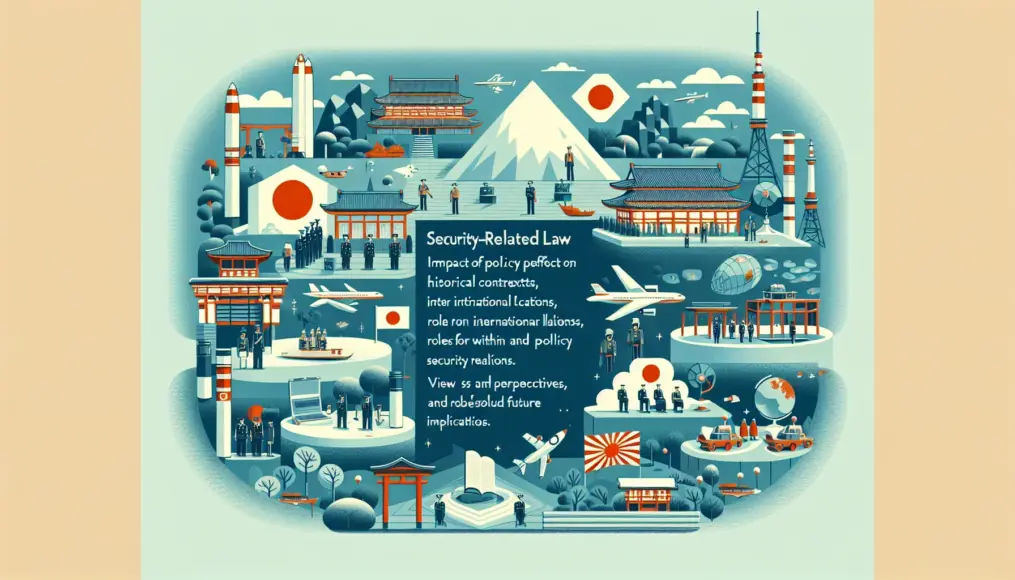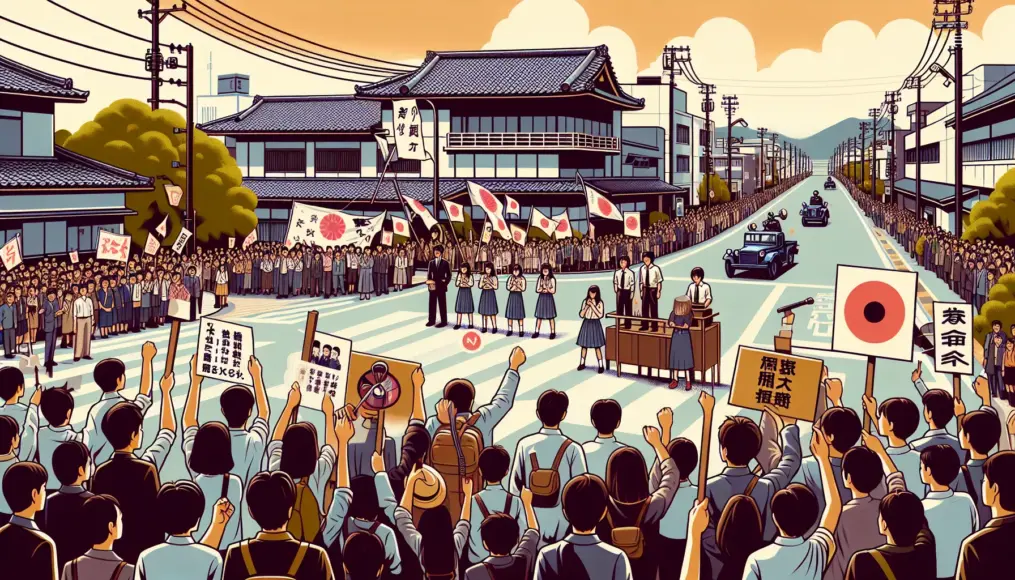The discussion surrounding the potential revision of Article 9 of Japan’s Constitution is a hot topic, with a variety of opinions emerging. This particular clause stands as a symbol of Japan’s post-war pacifism and holds significant value for many. However, as international relations and security concerns evolve, the necessity of this article has come under increasing scrutiny. So, is reforming Article 9 truly essential?
In this article, we will delve into the history and context surrounding the establishment of Article 9. We’ll present arguments from both supporters and opponents of the revision, while also examining the strategies of various political parties and the sentiments of the public. Through this exploration, we aim to uncover the true motivations behind the push for constitutional reform.
- Historical background and the establishment of Article 9
- The clash of arguments between proponents and opponents of the revision
- Strategies of political parties and public opinion surveys
The History and Background of Article 9 of the Japanese Constitution
Article 9 of the Japanese Constitution stands as a symbol of pacifism in post-war Japan. This provision expresses a strong commitment that Japan will never again engage in warfare. However, the context in which this constitution was established was heavily influenced by the international situation at the time and the sentiments of the Japanese people. To this day, there are ongoing discussions about the interpretation and potential revision of Article 9.
In this section, we will first explore Japan’s post-war pacifism, and then delve into how Article 9 was formulated. Understanding the historical context behind this constitutional article will deepen our insight into the current debates surrounding constitutional amendments.
Post-War Pacifism in Japan
After World War II, Japan aimed to build a new nation based on peace and democracy under the occupation of the Allied forces. During this period, many Japanese citizens felt the horrors of war acutely and vowed never to repeat the same mistakes. This sentiment led to the adoption of Article 9.
The article clearly states that “land, sea, and air forces will not be maintained,” establishing that Japan would not possess military power. This pacifist ideology significantly influenced Japan’s foreign policy and international relations, fostering a commitment to peaceful international cooperation.
- Post-war Japan emphasized peace and democracy
- Article 9 arose from the horrors of war
- Pacifism influenced international relations
The Formation of Article 9
The establishment of Article 9 was part of the Allied occupation policy. The influence of the United States was particularly strong, as they sought to ensure that post-war Japan would not possess military capabilities. This backdrop led to the drafting of the constitution, which was ultimately enacted in 1947.
From its inception, Article 9 has been a topic of debate, but its principles have been widely accepted by the Japanese populace. As a symbol of pacifism, it has deeply embedded itself in the national psyche. Understanding the formation of Article 9 is essential for considering the contemporary discussions around constitutional amendments.
If you’re interested in this topic, you might also want to check out the article “What Future Does the LDP’s Constitutional Amendment Proposal Bring?.” This link provides a detailed explanation of the background and specific content of the constitutional amendment proposal put forth by the Liberal Democratic Party, helping to further your understanding of the current debates surrounding Article 9.
- Article 9 was established under the influence of the Allied powers
- The Japanese Constitution was enacted in 1947
- Debate has existed since its early days, but pacifism has taken root
Key Issues Surrounding Constitutional Amendments
The debate over amending Article 9 of the Japanese Constitution has revealed a range of opinions, each backed by compelling arguments. Proponents of the amendment argue that Japan’s security environment has evolved, necessitating a reevaluation of the Constitution. On the other hand, opponents emphasize the importance of pacifism and highlight the risks that amendments could pose. The conversation around constitutional reform is multifaceted, requiring discussions from various perspectives.
In this section, we will explore both the arguments of those in favor of amendments and those against, aiming to gain a comprehensive understanding of the discussion surrounding the revision of Article 9.
Arguments in Favor of Amendments
Supporters of the amendment assert that revising Article 9 is essential for addressing current international conditions and the threats to Japan’s security. They particularly point to increasing military activities from neighboring countries and the rising threat of terrorism, arguing that it is crucial to clarify the role of the Self-Defense Forces. Through the amendment, they believe that Japan can establish a more robust defense system.
Furthermore, proponents also argue that from the perspective of international cooperation, a constitutional revision is necessary. As calls for Japan to participate in international peacekeeping operations and exercise collective self-defense grow, there is a mounting opinion that Japan should amend its Constitution to fulfill these roles effectively.
- The need to respond to changes in international conditions
- The importance of clarifying the role of the Self-Defense Forces
- Amendments to strengthen international cooperation
Opinions Against Amendments
Conversely, opponents of the amendment argue for the preservation of the pacifist ideals embodied in Article 9. They caution that amending the Constitution could increase the risk of war, emphasizing the role of the Constitution as a symbol of peace. There is a strong sentiment among the public for peace, and many believe that any changes should be approached with caution.
Additionally, opponents warn that constitutional amendments could exacerbate tensions both domestically and internationally. This viewpoint reflects a deep-rooted awareness among the public, informed by historical context.
- The importance of upholding pacifist ideals
- Risks of increasing the potential for war
- The need to consider public sentiment and historical context
Positions and Strategies of Each Political Party
The debate surrounding the amendment of Article 9 of the Constitution showcases a variety of positions and strategies among the political parties. The ruling party advocates for the amendment, actively pushing forward with a clear strategy. On the other hand, the opposition parties are adopting a stance of resistance, employing various strategies to protect Article 9. These dynamics significantly influence the future of constitutional reform in Japan.
In this section, we will take a closer look at the ruling party’s strategy for constitutional amendment and the opposition’s strategies for resistance. We will explore the reasoning behind each party’s stance and consider how their strategies may evolve moving forward.
Ruling Party’s Strategy for Constitutional Amendment
The ruling party is formulating specific strategies to promote the amendment of Article 9. They recognize the necessity of clarifying the role of the Self-Defense Forces amid increasingly stringent security conditions. To this end, they are developing plans to realize the constitutional amendment while also focusing on public relations efforts to gain the understanding of the citizens.
Additionally, the ruling party argues that amending the constitution is essential to strengthen international cooperation. By enabling the exercise of collective self-defense, they aim to enhance Japan’s role in the international community. Given this backdrop, the ruling party’s strategy involves crucial elements such as public awareness campaigns and creating opportunities for discussion among the populace.
- The need to clarify the role of the Self-Defense Forces
- Aiming to strengthen international cooperation
- Public relations activities to gain citizens’ understanding
Opposition’s Resistance Strategy
The opposition parties are actively employing resistance strategies to defend Article 9. They prioritize the principles of pacifism and express concerns that an amendment could heighten the risk of war. Through various activities, they aim to raise awareness among the public about the dangers of amendment and emphasize opposing viewpoints in legislative discussions.
Moreover, the opposition conducts public opinion surveys to gauge citizens’ anxieties and doubts regarding the amendment, striving to reflect these voices in their campaigns. In this way, the opposition’s resistance strategy focuses on engaging in dialogue with the public while broadly communicating the importance of Article 9.
- Activities aimed at upholding pacifist principles
- Public relations strategies highlighting the dangers of amendment
- A resistance movement emphasizing dialogue with the public
International Perspectives and Domestic Awareness
The way the international community views Article 9 of Japan’s Constitution is closely linked to domestic sentiments within Japan. While Japan’s pacifism is appreciated globally, its effectiveness is increasingly questioned in light of today’s security environment. This backdrop has led to a split opinion within Japan regarding the revision of Article 9. Understanding both the expectations of the international community and the voices from within Japan is vital for deepening the discourse around constitutional reform.
In this section, we will explore the positioning of Article 9 from an international perspective and examine the current social situation through public opinion surveys conducted among the Japanese populace.
Article 9 from an International Perspective
On the international stage, Article 9 of the Japanese Constitution is widely recognized as a symbol of post-war pacifism. Many countries value Japan’s stance on eschewing military force and prioritizing peace. However, with the recent shifts in international relations and regional security dynamics, there is also a growing call from the international community for Japan to bolster its defense capabilities.
Particularly in light of increased military activities from neighboring countries and the rising threat of terrorism, there is an expectation that Japan will take on a more proactive role. These expectations are influencing discussions around the interpretation and potential revision of Article 9.
- Article 9 as a symbol of post-war pacifism
- Expectations from the international community for enhanced defense capabilities
- Neighboring countries’ activities impacting Japan’s stance
Public Opinion on Article 9 in Japan
Within Japan, various public opinion surveys reveal a spectrum of views regarding Article 9. While there remains strong support for the article, there is also a gradual increase in voices advocating for its revision. Notably, younger generations are becoming more conscious of security issues, leading to heightened interest in constitutional reform.
Moreover, there exists a complex interplay between the desire to maintain peace and the belief that Japan should fulfill its international responsibilities. These evolving sentiments represent a significant factor that will influence future discussions on constitutional amendments.
For those seeking a deeper understanding of this topic, we recommend reading the article “A Deep Dive into the LDP’s Constitutional Draft: Its Impact on Modern Japan.” This piece provides a detailed analysis of the constitutional draft proposed by the Liberal Democratic Party, exploring its historical context and implications for contemporary Japan. It’s a valuable resource for anyone looking to enhance their understanding of the constitutional reform debate.
- Strong support for Article 9 remains
- Rising interest in revisions among younger generations
- Intersecting views on international responsibilities and peacekeeping
Conclusion
The debate surrounding the amendment of Article 9 of the Japanese Constitution is a crucial issue for the nation’s future. In this article, we have explored the history and background of Article 9, the key points of contention regarding its amendment, the positions of various political parties, and the perspectives of both the international community and the Japanese public. Both proponents and opponents of the amendment have valid arguments, reflecting the diverse opinions present among the populace.
Particularly, the changing international landscape and the growing awareness of domestic security are significant factors prompting questions about the necessity of constitutional reform. Moving forward, it is essential that these discussions incorporate a wide range of viewpoints and encourage broader public participation.
- There are diverse opinions regarding the amendment of Article 9
- Changes in international dynamics are influencing the debate on amendments
- It is crucial to engage in discussions that reflect the public’s awareness
As we continue to monitor developments related to constitutional amendments, it is important for each citizen to form and express their opinions. We invite you to share your thoughts and insights in the comments!



Comment